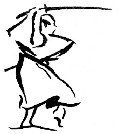| Home
From The Gallowgate
From The Leazes
Fixtures Lists
Match Report
Month That Was
Squad Profiles
History
Club Info
Stats
Photo Page
Photo2 Page
Photo3 Page
|
Welcome to My Store... The Perfect Place to Find Great Products

death poems
Hôjô Ujimasa1
1538-1590
Autumn wind of eve,
blow away the clouds that mass
over the moon's pure light
and the mists that cloud our mind,
do thou sweep away as well.
Now we disappear,
well, what must we think of it?
From the sky we came.
Now we may go back again.
That's at least one point of view.
--------------------------------------------------------------------------------
Minamoto Yorimasa2
1104-1180
Like a rotten log
half buried in the ground -
my life, which
has not flowered, comes
to this sad end.
--------------------------------------------------------------------------------
Ota Dokan3
1432-1486
Had I not known
that I was dead
already
I would have mourned
my loss of life.
--------------------------------------------------------------------------------
Ôuchi Yoshitaka4
1507-1551
Both the victor
and the vanquished are
but drops of dew,
but bolts of lightning -
thus should we view the world.
--------------------------------------------------------------------------------
Shiaku Nyûdo5
d.1333
Holding forth this sword
I cut vacuity in twain;
In the midst of the great fire,
a stream of refreshing breeze!
--------------------------------------------------------------------------------
Takemata Hideshige6
(After being defeated by Shibata Katsuie)
Shall Ashura
subdue a man like me?
I shall be born again
and then I'll cut the head
off Katsuie...
--------------------------------------------------------------------------------
Tokugawa Ieyasu7
1542-1616
Whether one passes on or remains is all the same.
That you can take no one with you is the only difference.
Ah, how pleasant! Two awakenings and one sleep.
This dream of a fleeing world! The roseate hues of early dawn!
--------------------------------------------------------------------------------
Toyotomi Hideyoshi8
1536-1598
My life
came like dew
disappears like dew.
All of Naniwa
is dream after dream.
--------------------------------------------------------------------------------
Uesugi Kenshin9
1530-1578
Even a life-long prosperity is but one cup of sake;
A life of forty-nine years is passed in a dream;
I know not what life is, nor death.
Year in year out-all but a dream.
Both Heaven and Hell are left behind;
I stand in the moonlit dawn,
Free from clouds of attachment.
Store Name Goes Here
Get More Great Deals at one of my other stores.
SAMURAI
ADACHI TOKIAKI
ADACHI YASUMORI,
AKAMATSU MITSUSUKE
AKECHI MITSUHIDE
AMAKO AKIHISA
AMAKO TSUNEHISA
ANAYAMA BEISETSU
ANKOKUJI EKEI
BABA NOBUFUSA
CHOSOKABE MOTOCHIKA
DATE MASAMUNE
DATE TERUMUNE
FUKUSHIMA MASAMORI
GOTO MOTOTSUGU
HÔJÔ TOKIMASA
IMAGAWA SADAYO
IMAGAWA YOSHIMOTO
ISHIKAWA KAZUMASA
KAJIWARA KAGETOKI
--------------------------------------------------------------------------------
SAMURAI
The Origins of Japanese Samurai
The Japanese samurai warriors came into existence in the 12th century when two powerful Japanese clans fought bitter wars against each other - the Taira and the Minamato. At that time the Japanese shogunate, a system of a military ruler, called the shogun was formed. Under the shogun the next hierarchy were the daimyo, local rulers comparable to dukes in Europe. The Japanese samurai were the military retainers of a daimyo. And finally you may have heard of ronin. Ronin are samurai without a master. This is what happened to the 47 Ronin in the famous story of Chushingura after their lord was forced to commit suicide.
According to historians the fierce fights between hostile clans and war lords was mainly a battle for land. Only 20 percent of Japan's rugged and mountainous area can be used for agriculture.
Samurai Attributes and Privileges
Samurai warriors had several privileges. They were allowed to wear two swords - a long one and a short one. Commoners were not allowed to wear any weapons at all. At a certain period samurai warriors were even allowed to behead a commoner who had offended them.
The Japanese samurai caste itself had different ranks with different privileges. A basic ranking system from the twelfth century distinguished three major ranks:
kenin - meaning "housemen". They were the administrators or vassals.
mounted samurai - Only high-ranking samurai warriors were allowed to fight on horse-back.
foot soldiers
During the end of the 15th century, the Ashikaga shogunate had lost control over the country. Powerful feudal lords had ravaged Japan in a series of civil wars lasting for nearly 100 years. When Toyotomi Hideyoshi could finally unify Japan, he introduced a series of reforms thus changing the life of the samurai class. He made the samurai live permanently in castles. Until then they were farming their own land during peacetime. It was like the change from an army of draftees to an army of professionals. To finance the system, Toyotomi Hideyoshi introduced a rice taxation system under which every samurai warrior received a certain amount of rice depending on his rank.
The samurai warriors had an ethic code of behavior called bushido, meaning "way of the warrior". The central point of the bushido was complete loyalty towards the lord, the daimyo.
Belonging to the Japanese samurai class was a hereditary membership.
Seppuku - a Part of Samurai History
It would be honerbel to say a deat poem when whene your blood is spilt

My Name, You Friendly Store Owner
Have a comment?
Send me an Email I'd love to hear from you!
Getting Rich QuickFrom My Site!
Want to open an online store of your own in minutes?
|

